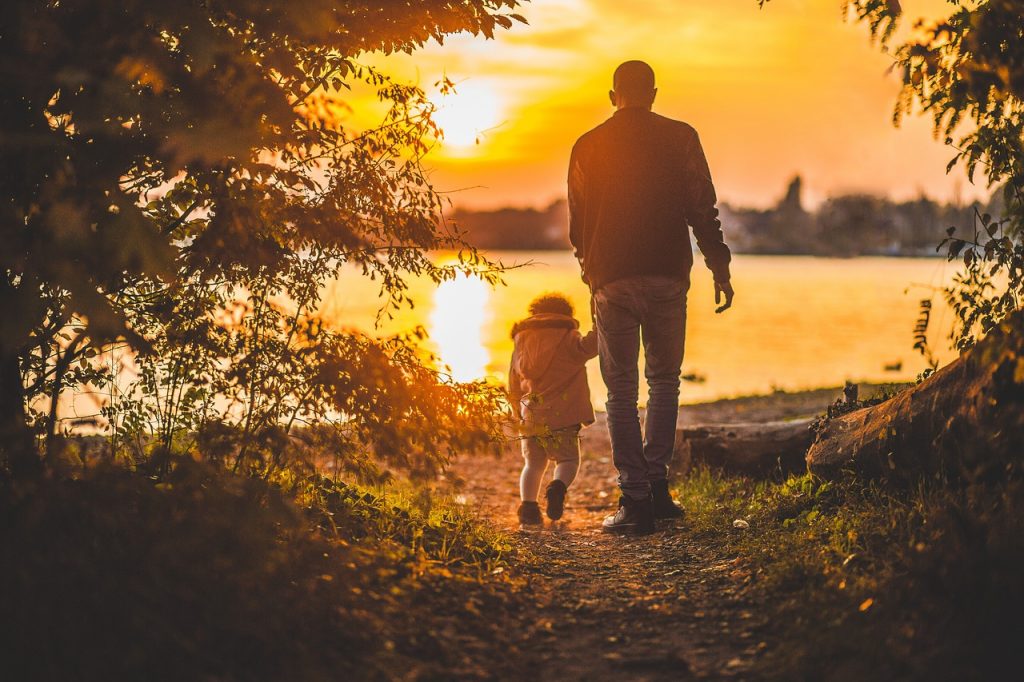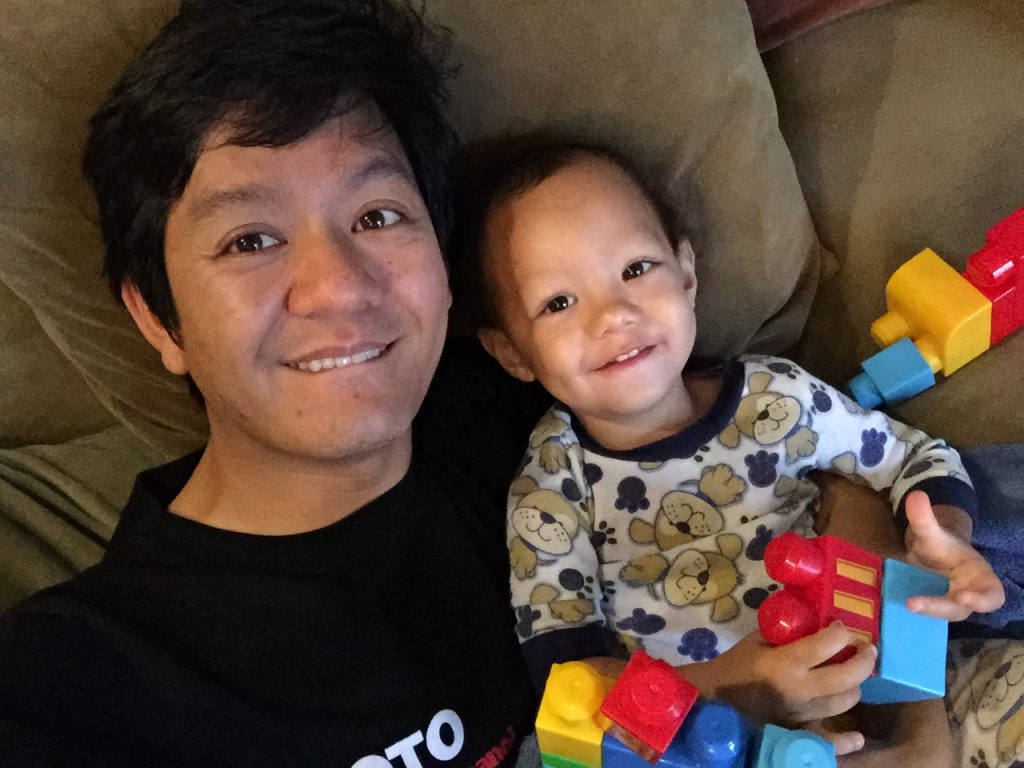
Last week, for example, I walked with my four-year-old son and his maternal grandmother to the light rail station. He was heading north to preschool, and I was going South to the airport for a three-day work trip to keynote in Las Vegas and Salt Lake City, so we had to separate and be on opposite sides of the track. I stooped down and hugged him tight as we separated. “I love you, Baby,” I whispered to him.
Across the tracks, holding his grandmother’s hand, he waved at me, beaming. “Hi Daddy!” he said. People on the platforms smiled. I felt a little sheepish as my son called out, “Daddy, I’m over here, Daddy!” For five minutes we waved. I played peek-a-boo with him, knowing that were both too old for it. My train arrived first. As I got on, he shouted, “I love you, Daddy!”
I rushed to the window. He was still standing there, waving one tiny hand. The morning sunlight played in his curly brown hair, and I got this bittersweet feeling that this was one of those memories that I needed to burn into my mind, embed into my being, because my son, my little baby, was growing up, and soon the only remnants of these days will be these few faded, elusive images that I can conjure among other faded images.
At some point, he won’t wave to me like this anymore. He’ll be embarrassed to be seen in public with his dad. Someday, he won’t ask me to help him put on his shoes. He won’t ask to sit on my lap so we could read his favorite book about dragons four or five times. He won’t say “paghetti” and “potsickers”—his favorite foods. Someday soon, he won’t need to stand on his little blue step stool to reach the faucet to brush his teeth. Soon, he will enter kindergarten, then high school. He’ll move out. He’ll call to say he got a new job on the moon colony. By then we’ll have a moon colony. I’ll make a speech at his wedding, reminiscing about when he was four, and I’ll feel proud and sad and old. I’ll wish for him and his partner and kids to visit more often. I’ll suggest we go camping at that new park on Mars.
I remember only four years ago I held him, filled with so much love and only weirded out a little by his conical, alien-looking head. I held a wrinkly pink foot in one hand, and at that moment I felt as if someone had flipped an hourglass on my time with my son. Looking at my sleeping newborn, I thought, “This is a memory; soon, this day is just something I can only wistfully remember while staring at pictures.” Across the late-nights, the sleeplessness-induced hallucinations, the long days where we smelled like spit up and mashed bananas, I tried to preserve the details. I took thousands of pictures and video clips. I was not going to let Time win without a fight.
But so many moments came too fast for me to capture. The first time he reached out and touched my face. The first time he grasped the edge of the coffee table and pulled himself up. The magical day he first laughed. My wife held him; he peeked over her shoulder at me; we played peek-a-boo while walking; I made a funny face, and his toothless grin burst out with a cascade of chuckles.
Each happy moment was tinged with a slight edge of sadness; I always felt like the sand in our hourglass was running out. I wrote him a letter in case something happened to me. Soon he was crawling, and I chased after him to remove dust bunnies and other things he would cram into his mouth. Then he walked. He became more aware of his world, the good things, and the bad. One day, he was playing a few feet from me in the living room, and a loud noise from our neighbors downstairs startled him. He ran, panicking, into my arms. “Dadda! Dadda! Dadda!” he screamed, completely freaked out. I held him, awed by the complete trust he had in me to keep him safe. He calmed down, and I wondered then how long before we reached the day when he realized that his father was just as scared all the time. Each time he got a fever. Each time he fell. Like other parents, I saw danger everywhere. Every corner of every table. I looked behind every bookshelf to make sure it’s tethered to the wall. And it’s not just the physical dangers, but the emotional ones as well. “The kids at school make fun of me,” he said one day, “They call me Crazy Hair.” It was like getting stabbed in the heart, thinking of anyone saying this to him, wounding his spirit this way.
The sand in the hourglass kept flowing mercilessly. The days of my comforting him led to days where he tried to comfort me. One evening we were playing with Legos, and I accidentally knocked down the tower I was building. “Oh no!” I said. “What happened?” he asked. “My tower fell down,” I said. He looked at me and my shattered Lego pieces. “It’s OK, Daddy, you can try again.” It was like that one short story I read in high school, where a son finally beats his father at wrestling, and at that moment, they both felt the weight of time and mortality. I readied my phone, rebuilt the tower, and knocked it down again. I was able to capture his response on video. Take that, Time, you relentless bastard!
But Time always wins. My son’s train arrived as soon as mine did. I looked for him as he and his grandmother got on, to wave at him one last time, to get a last glimpse across the windows. But I didn’t see him. Our trains sped off in opposite directions, taking my baby farther and farther away from me. All the fears a parent experiences came rushing to me. What if something happens? What if this is the last time I see him? I didn’t even shout “I love you too” back at him. At the airport, I sat down and tried to contain my thoughts and the mixture of emotions I was feeling: the weight of time, of existence; the paradoxical joys and pain of being a parent and loving someone so much that you are in a constant state of fear and worry.
Despite how bittersweet they are, I am grateful for these memories, and I know there are many things to look forward to as my son grows. And we get to re-experience many of these memories through our second child, who deserves his own post. But like parents everywhere, I wish for the hourglass to slow down so these days could last a little longer. These days when my four-year-old’s eyes barely peek over the edge of the dining table; when our three-block walk takes over an hour because he needs to stop to look at every rock and bug and twig.

In my keynotes, I talked about the urgency of everything going on, the fears gripping our communities. I ended, as usual, with a note of gratitude for the people working to make the world better, safer, more just. The memory of my son waving to me across the train tracks made the speech this time extra poignant for me. We parents say goodbye to our kids each day, and we hope that the world they enter into will love them as much as we do, and will protect them and keep them safe so that they will return home to us whole. Building such a world is what nonprofits do. This, for me, is the biggest reason why I love our sector, and why I love the people in it.
—
Support the maintenance of this website by buying NWB (Now NAF) t-shirts and mugs and other stuff.
Make Mondays suck a little less. Get a notice each Monday morning when a new post arrives. Subscribe to NAF by scrolling to the top right of this page (maybe scroll down a little) and enter in your email address (If you’re on the phone, it may be at the bottom). Also, join the NAF Facebook community for daily hilarity.
Also, join Nonprofit Happy Hour, a peer support group on Facebook, and if you are an ED/CEO, join ED Happy Hour. These are great forums for when you have a problem and want to get advice from colleagues, or you just want to share pictures of unicorns. Check them out.
Donate, or give a grant, to Vu’s organization, Rainier Valley Corps, which has the mission of bringing more leaders of color into the nonprofit sector and getting diverse communities to work together to address systemic issues.

